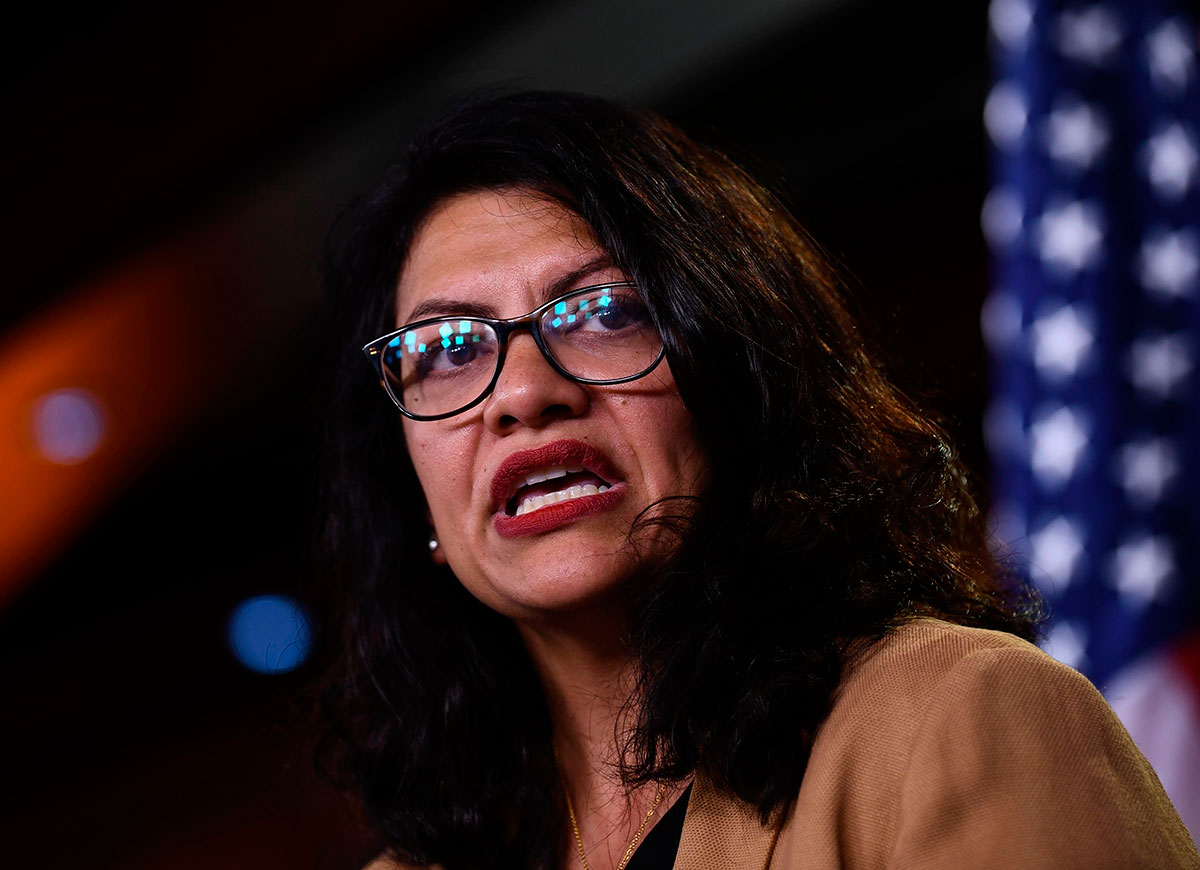Palestinian-American Rashida Tlaib has emerged as one of the most vocal opponents of US President Donald Trump: a Muslim woman with Arab roots, unafraid to take on the White House, and even members of her own Democratic party, on issues ranging from Israel to immigration.
Tlaib, who turns 43 on July 24, was born in Detroit to working class Palestinian immigrants from the West Bank and East Jerusalem. Her political career began in 2004 with an internship for a Michigan state representative Steve Tobocman, a position she took shortly after earning a law degree from Western Michigan University’s Cooley Law School.
In 2008, Tlaib ran for Tobocman’s now vacant seat in the Michigan House of Representatives, emerging as an unlikely winner with 90 percent of the vote in a predominantly Hispanic and African-American district, in which she faced a number of Latino competitors in the primary.
 US Representative Rashida Tlaib, Democrat of Michigan, speaks during a press conference after receiving a computer flash drive from activist at the US Capitol in Washington, DC, May 9, 2019. – The drive contains 10 million signatures on a petition urging the US Congress to begin impeachment proceedings against US President Donald Trump. (PhotoL SAUL LOEB/AFP/Getty Images).
US Representative Rashida Tlaib, Democrat of Michigan, speaks during a press conference after receiving a computer flash drive from activist at the US Capitol in Washington, DC, May 9, 2019. – The drive contains 10 million signatures on a petition urging the US Congress to begin impeachment proceedings against US President Donald Trump. (PhotoL SAUL LOEB/AFP/Getty Images).
During her five years in Michigan politics, Tlaib was one of only 10 Muslims serving in state legislations across America, and only the second Muslim woman in American history.
Congresswoman Tlaib
In 2018, Tlaib made international headlines by being elected to the US House of Representatives, becoming the first Palestinian-American in Congress and one of the two first Muslim women elected, alongside Minnesota Democrat Ilhan Oman.
Tlaib’s congressional oath of office ceremony made it clear she was unlike any politician seen in Washington DC before: she swore in on an English-language copy of the Quran and wore a Thobe, a traditional Palestinian dress. Her choice of attire for the event even spawned a viral hashtag – #TweetYourThobe – that was shared by thousands of Arab-American women across the country.
Immediately following her election, Tlaib told NBC that she believed she was part of a ‘new era’ of politicians focused on social justice in America.
“Yes, I’m a woman. I’m a woman of colour, and yes, I made history,” she said. “I feel like I’m part of this larger movement that’s happening…..we are now going to be at the table, be able to give a voice to so many people that feel left out right now.”
Supporting the BDS movement
Although Tlaib has said she remains largely focused on local issues relevant to her constituency in Michigan, her time in office has also been characterised by her support of the Boycott, Divestment and Sanctions (BDS) movement, a global movement aimed at boycotting Israeli-made products to change the country’s policies towards the Palestinian people.
Several weeks ago, for example, Tlaib slammed a bill from the House Foreign Affairs Committee condemning the BDS movement as “unconstitutional.”
The measure, she tweeted, is meant “to silence opposition of Israel’s blatantly racist policies that demonise both Palestinians and Ethiopians.”
.@HouseForeign wants to move forward w/ #HR246 #AntiBDS bill to silence opposition of Israel's blatantly racist policies that demonize both Palestinians & Ethiopians.
Our 1st Amd. right to free speech allows boycott of inhumane policies. This bill is unconstitutional. https://t.co/6VJUtBbogy
— Rashida Tlaib (@RashidaTlaib) July 10, 2019
The ‘Squad’
Tlaib’s opposition to the Trump administration has not gone unnoticed. Several weeks ago, the US President went as far as to urge Tlaib – alongside fellow congresswomen Ilhan Omar, Ayanna Pressley and Alexandria Ocasio-Cortez – to “go back” to the countries they’ve come from.
Of the four, all US citizens, only Omar was born outside the United States.
Just this week, the President doubled down on his comments, saying that he does not believe Tlaib and the other three congresswomen “are capable of loving our country.”
Challenges ahead
While Tlaib’s opposition to Trump – which has included expletive-laden rants calling for his impeachment – has raised her profile among American voters and the world’s media, some in her home state have called on her to focus more on local issues and less on the President.
 U.S. Rep. Alexandria Ocasio-Cortez (D-NY) speaks as Reps. Ayanna Pressley (D-MA), Ilhan Omar (D-MN) and Rashida Tlaib (D-MI) listen during a news conference at the U.S. Capitol on July 15, 2019 in Washington, DC. (Photo by Alex Wroblewski/Getty Images).
U.S. Rep. Alexandria Ocasio-Cortez (D-NY) speaks as Reps. Ayanna Pressley (D-MA), Ilhan Omar (D-MN) and Rashida Tlaib (D-MI) listen during a news conference at the U.S. Capitol on July 15, 2019 in Washington, DC. (Photo by Alex Wroblewski/Getty Images).
“I just want her to stay focused more on the district rather than all the national attention she’s getting,” Keith Williams, chairman of the Democratic Black Caucus in Michican was quoted as saying this week in the Wall Street Journal. “Stay out of the press. Get on point. Detroit is hurting.”
Tlaib, for her part, has remained steadfast.
“Being the unapologetic person that I am and standing very firm and strong and saying I want to impeach [Trump], at that moment that’s what I felt and that’s what I wanted to say,” she said. “If anything, it just reinforces that I’m real. It reinforces that I’m not your typical polished politician.”








